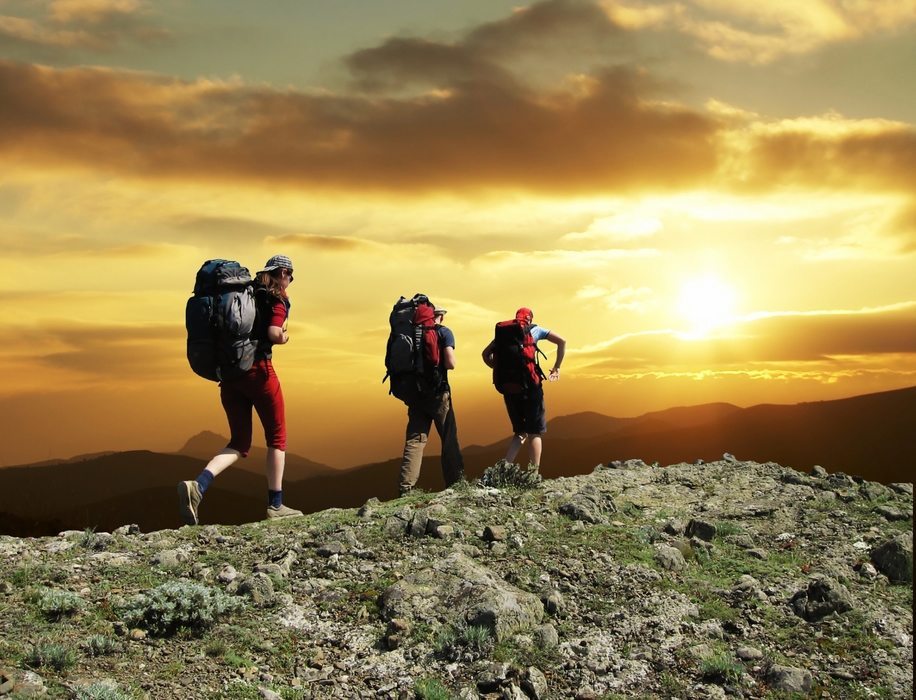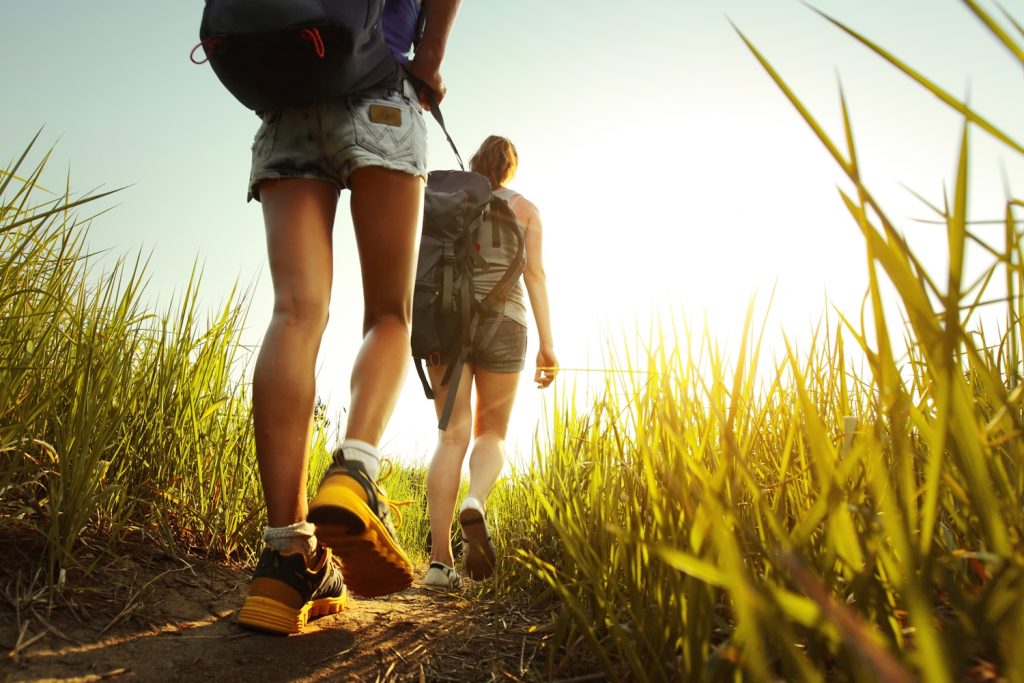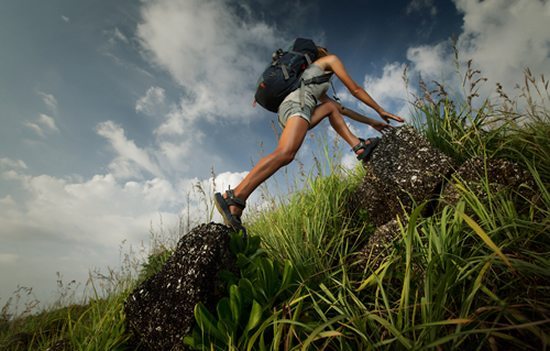Backpacking for the first time? A little nervous? Feel like there’s something that you should know or do but you just can’t imagine what it is? No worries, we gotcha’ covered. This guide will ensure that you have a safe, fun time backpacking and, hopefully, you’ll want to do it again and again.
Table of Contents
- 1 Backpack with an Experienced Partner
- 2 Be Realistic and Think about your Backpacking Destination
- 3 Choose the Right Backpack
- 4 Choose the Right Backpack Gear
- 5 Clothing for Backpacking
- 6 Food for Energy and Emergency (Just in case!)
- 7 Communications
- 8 Prior to Departure
- 9 Don’t Panic…if You Get Lost
- 10 Backpacking, Camping, Outdoor Adventure Etiquette
Backpack with an Experienced Partner

You can either join a hiking and backpacking group or join up with a friend or acquaintance that has some experience. Not only is this safer but it also adds to your peace of mind and, let’s face it, probably a lot more fun than going solo, right? You’ll learn a lot more about yourself and hiking if you’re doing it with people who are knowledgeable and willing to impart that experience onto you.
Check out Facebook and Hiking forums for hiking groups in you area.
Be Realistic and Think about your Backpacking Destination
Taking the kids? How about a dog? How long is the hike? What’s the difficulty level? These are all things that you need to consider before actually throwing a pack on your back and going.
On a lighter note: Are there any cool geographical features to see on the hike? How about a waterfall. Try looking up the history of the area and the history of the trail. Maybe you’re an avid bird watcher or a “flower freak”. These are all things that can enhance the awesomeness of a hiking trail.
-
Trip Distance
Our best advice for beginners to keep your initial hikes to one night or single day trips. Keep the distance to a maximum of 10 miles, round trip. This will help you gain experience and figure out which kind of backpacker you are: Frequent stops? How much water do you consume?, etc.
One of our favorite things to do is to hike into a location early one morning and set up camp. Then spend the night hydrating and relaxing. Take a day of camping and enjoy being off the grid. Then hike back. That way you’re really only doing a one night hike but staying and chilling to refresh before heading back.
-
Trip Info
Soak up as much information about your hiking trail and location/destination as you can before you start to backpack. Here are a few great resources for finding all kinds of helpful information on trails:
Websites/Forums: We especially like backpacking.net and trailforums.com
Guide books: Pay attention to star ratings in both the difficulty level and “interest” of the hike. Some reviewers will give star ratings on beauty and scenic quality.
Experienced Hiking Friends and Backpackers: A wealth of first-hand knowledge that you can trust in and ask for more details.
National and State Park Services: Many of the best trails are within national or state park boundaries. You can never go wrong by asking a Park Ranger.
Choose the Right Backpack
Choose a backpack that is right for you taking into account the following criteria:
- Capacity
- Size
- Material
- Ease of Load and Offload
Hiking Hydration has a great informational page on choosing the best backpack.
Choose the Right Backpack Gear
You may never use that signalling mirror, but you need to know how to use it. Know your hydration pack inside and out. KNOW EVERY PIECE OF YOUR GEAR AND HOW TO USE IT!
Check out our very helpful articles and pages on the subject of Hiking and Backpacking Gear:
Clothing for Backpacking

Believe it or not, there’s a certain way to dress and factors that you have to take into consideration for backpacking clothes. We’ve written many guides on the subject at the below locations:
Food for Energy and Emergency (Just in case!)
A few things that you need to take into consideration here is meals, snacks, and food storage. The only thing that you really need to be drinking is water or something that is high in electrolytes. No energy drinks or caffeine!
Check out our full article on Hiking food and Energy.
If you’re feeling really good about your skills or already have some experience then try out one of our famous, jerky recipes for the trail!
Communications
You probably already know this, but if you don’t then you shouldn’t really depend on a cell phone as your only line of communication to the world when you’re camping, hiking, or doing anything off the grid. The reception is bound to be terrible or non-existent.
Consider investing in a satellite phone, satellite messenger, radios (2-way), and some personal locator beacons. Again, this is all depending on how “off the grid” you’re getting. But seriously, don’t count on cell phone reception.
Prior to Departure

Before you go, here’s what we recommend that you do to ensure that you and everything else is working well together:
- Practice: Test equipment, set up tents, inflate and deflate. Check batteries bulbs. All the pre-execution checks that you can think of!
- Prepare: Call ahead and make sure that the trail is open and that weather will cooperate. You never want to hike into an imminent or flash flood potential.
- Tell Someone: Leave detailed plans and location information with at least one friend. Let them know that if you’re not back by a pre-agreed time then it’s possible that you need help and to send someone. Make sure that they don’t “wait and see”.
Don’t Panic…if You Get Lost
The Emergency Response Institute of Olympia likes the acronym S-T-O-P in a panic or worry situations.
STOP: If you feel uncomfortable, worried or have the slightest “I might be lost” or “I might be in trouble” feeling then you need to stop. Don’t panic. Count to 10. Drink water. Rest and eat an energy bar. Gather your wits. Don’t go off the deep end. Remember, you’re smart and durable.
Think: Remember your last known point. How far back was it? (Minutes or distance, it doesn’t matter) Can you get back there? What can you hear? What can you see? Hear traffic? A mill? See mountain tops, energy towers, water towers, etc.
Observe: Become a Video Camera PLUS: Put all of your 5 senses on full, red alert and make them do what they are made to do. Note what you observe, hear, smell, feel, etc. Don’t let the panic confuse or numb your senses. Gain control of yourself and make your body work for you.
Plan: Plan it out and say it out loud. Even if you’re alone…say your plan out loud so that your ears hear it. If you’re in a group then make sure everyone understands the plan and make sure they all say it out loud for memory and assurance.
Backpacking, Camping, Outdoor Adventure Etiquette
Pack Out What You Pack in: Don’t leave garbage or equipment behind. Your aim should be to leave no trace, save for a rock fire wall, of your existence in the wilderness. Keep it clean and keep the country, country.
It’s Fun but it’s not a game: It might be recreation. It be a vacation. But it’s not a theme park. The outdoors is unpredictable. There are no handrails and no signs that say “you must be this tall to ride this ride”. Stay alert and stay alive.
Keep it Peaceful: There’e nothing worse then getting into the outdoors only to realize that someone is trying to turn it into a raucous night club. Don’t be that person. People want to relax and get away from the noise.












